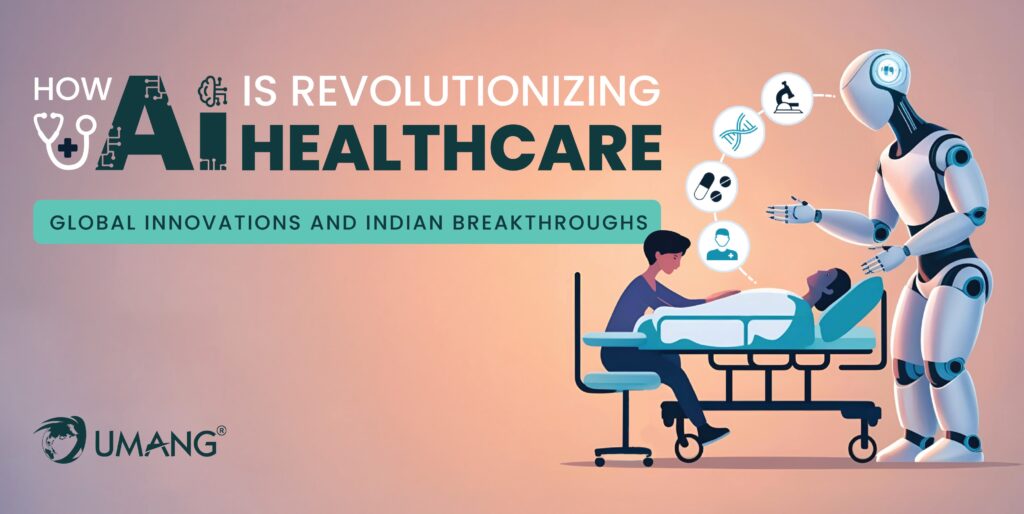How AI is Revolutionizing Healthcare: Global Innovations and Indian Breakthroughs
In recent years, Artificial Intelligence (AI) has become a powerful force in reshaping healthcare. From accurate diagnoses and predictive analytics to personalized medicine and robotic surgery, AI is helping healthcare professionals provide smarter, faster, and more effective care.
What’s exciting is that this transformation isn’t limited to Silicon Valley or big pharma. Across the globe—and right here in India—startups and innovators are building impactful AI solutions that are saving lives and making healthcare more accessible.

In recent years, Artificial Intelligence (AI) has become a powerful force in reshaping healthcare. From accurate diagnoses and predictive analytics to personalized medicine and robotic surgery, AI is helping healthcare professionals provide smarter, faster, and more effective care.
What’s exciting is that this transformation isn’t limited to Silicon Valley or big pharma. Across the globe—and right here in India—startups and innovators are building impactful AI solutions that are saving lives and making healthcare more accessible.
Let’s dive into the latest AI solutions in healthcare, backed by real examples from both Indian and global ecosystems.
1. AI in Diagnostics: Catching Diseases Early, Saving Lives
AI’s ability to analyze medical images and clinical data with remarkable speed and precision has transformed diagnostics.
Global Example: Aidoc (Israel)
Aidoc uses AI to analyze CT scans in real time, identifying critical conditions like brain bleeds or pulmonary embolisms within minutes.
Indian Example: Qure.ai (Mumbai)
Qure.ai’s deep learning algorithms interpret X-rays and CT scans to detect TB, head injuries, and more—used in over 70 countries and deployed by state health departments in India.
Why it matters: AI cuts diagnosis time, improves accuracy, and ensures early intervention—especially in resource-constrained settings.
2. Virtual Health Assistants & AI Chatbots
AI-powered virtual assistants are helping millions get timely medical advice, book appointments, and even manage chronic conditions—all from their smartphones.
Global Example: Babylon Health (UK)
Babylon’s AI chatbot gives symptom-based advice and connects users to doctors instantly.
Indian Example: mfine (Bengaluru)
mfine combines AI with telemedicine to offer instant consultations. Its AI engine helps doctors make quicker and more accurate diagnoses.
Why it matters: Virtual assistants increase healthcare access, particularly in rural or under-served regions, and reduce the burden on healthcare staff.
3. Predictive Analytics: Prevent Before You Treat
AI systems can analyze a patient’s history, symptoms, and even behavior to predict medical events before they happen.
Global Example: Health Catalyst (USA)
Their platform enables hospitals to predict patient deterioration, enabling timely intervention and reducing emergency readmissions.
Indian Example: Niramai (Bengaluru)
Niramai uses AI-based thermal imaging and machine learning to detect breast cancer at an early stage—non-invasive, radiation-free, and cost-effective.
Why it matters: Predictive analytics enable proactive care, better resource management, and improved outcomes.
4. Robotic Surgery with AI Precision
Robotic surgical systems powered by AI are enabling complex surgeries with improved precision, minimal invasiveness, and faster recovery.
Global Example: da Vinci Surgical System (USA)
This globally renowned robotic platform allows surgeons to perform intricate operations with enhanced control and visualization.
Indian Example: SS Innovations (Gurugram)
Founded by robotic surgery pioneer Dr. Sudhir Srivastava, Mantra is India’s first indigenously developed surgical robot—bringing affordable robotic surgery to Indian hospitals.
Why it matters: AI-assisted surgeries lead to better patient safety, shorter hospital stays, and improved long-term outcomes.
5. Drug Discovery Powered by AI
AI is revolutionizing drug discovery by analyzing complex biological data to identify potential drugs faster and more affordably.
Global Example: Insilico Medicine (Hong Kong)
Insilico used AI to discover a new fibrosis drug candidate in just 46 days—dramatically faster than traditional methods.
Indian Example: Bugworks Research (Bengaluru)
Bugworks is using AI to combat antibiotic resistance by designing next-gen antibiotics effective against drug-resistant bacteria.
Why it matters: Faster, more affordable drug discovery accelerates access to life-saving treatments.
6. Personalized Medicine & Genomics
AI is helping decode complex genetic data to tailor medical treatments to individuals—ushering in the age of personalized medicine.
Global Example: Tempus (USA)
Tempus uses AI to analyze clinical and genomic data to recommend customized cancer treatments.
Indian Example: Mapmygenome (Hyderabad)
This genomics company uses AI to deliver DNA-based wellness insights, personalized health plans, and disease risk assessments.
Why it matters: Personalized care improves treatment effectiveness and reduces the risk of side effects.
7. AI in Mental Health Monitoring
AI can detect signs of stress, depression, or anxiety using speech, behavior, or typing patterns—enabling early mental health intervention.
Global Example: Woebot (USA)
Woebot is an AI chatbot that uses cognitive behavioral therapy (CBT) techniques to support users struggling with mental health issues.
Indian Example: Wysa (Bengaluru)
Wysa is an AI-powered mental health app used by over 5 million people across 65 countries. It offers CBT, guided journaling, and mood tracking.
Why it matters: AI democratizes mental health support, offering affordable help with zero judgment.
Ethical and Practical Challenges
While the benefits of AI in healthcare are clear, some challenges remain:
~ Data privacy and security
~ Bias in training datasets
~ Regulatory approval and clinical validation
~ Need for human oversight and accountability
Governments and healthcare institutions must work hand-in-hand with AI innovators to address these concerns ethically and inclusively.
India’s Role in the AI-Healthcare Revolution
India is not just adopting AI—it’s contributing meaningfully to global health innovation. From affordable diagnostics to scalable digital health platforms, Indian startups are solving real-world problems that impact millions.
Coupled with global innovations, this wave of AI-driven healthcare solutions is leading us toward a world where healthcare is:
~ Predictive rather than reactive
~ Personalized rather than generic
~ Proactive rather than passive
AI is not replacing doctors—it’s empowering them. With the ability to analyze massive datasets, predict outcomes, and support better decisions, AI is unlocking a future of accessible, efficient, and empathetic healthcare.
As India and the world embrace this change, the focus must remain on building inclusive, human-centered AI solutions that prioritize patient safety, equity, and trust.
